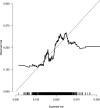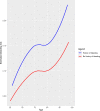External validation and updating of prediction models of bleeding risk in patients with cancer receiving anticoagulants
- PMID: 37055175
- PMCID: PMC10106080
- DOI: 10.1136/openhrt-2023-002273
External validation and updating of prediction models of bleeding risk in patients with cancer receiving anticoagulants
Abstract
Objective: Patients with cancer are at increased bleeding risk, and anticoagulants increase this risk even more. Yet, validated bleeding risk models for prediction of bleeding risk in patients with cancer are lacking. The aim of this study is to predict bleeding risk in anticoagulated patients with cancer.
Methods: We performed a study using the routine healthcare database of the Julius General Practitioners' Network. Five bleeding risk models were selected for external validation. Patients with a new cancer episode during anticoagulant treatment or those initiating anticoagulation during active cancer were included. The outcome was the composite of major bleeding and clinically relevant non-major (CRNM) bleeding. Next, we internally validated an updated bleeding risk model accounting for the competing risk of death.
Results: The validation cohort consisted of 1304 patients with cancer, mean age 74.0±10.9 years, 52.2% males. In total 215 (16.5%) patients developed a first major or CRNM bleeding during a mean follow-up of 1.5 years (incidence rate; 11.0 per 100 person-years (95% CI 9.6 to 12.5)). The c-statistics of all selected bleeding risk models were low, around 0.56. Internal validation of an updated model accounting for death as competing risk showed a slightly improved c-statistic of 0.61 (95% CI 0.54 to 0.70). On updating, only age and a history of bleeding appeared to contribute to the prediction of bleeding risk.
Conclusions: Existing bleeding risk models cannot accurately differentiate bleeding risk between patients. Future studies may use our updated model as a starting point for further development of bleeding risk models in patients with cancer.
Keywords: atrial fibrillation; epidemiology; pharmacology; pharmacology, clinical.
© Author(s) (or their employer(s)) 2023. Re-use permitted under CC BY-NC. No commercial re-use. See rights and permissions. Published by BMJ.
Conflict of interest statement
Competing interests: SvD reports an unrestricted institutional grant for performing research in the field of stroke diagnosis from Stoffels-Hornstra. G-JG, FR and MH report unrestricted institutional grants for performing research in the field of atrial fibrillation from Boehringer-Ingelheim, Bayer Healthcare, BMS Pfizer and Daiichi Sankyo. FAK reports research support from Bayer, BMS, BSCI, MSD, Leo Pharma, Actelion, The Netherlands Organisation for Health Research and Development, The Dutch Thrombosis Association, The Dutch Heart Foundation and the Horizon Europe Program. ICVG reports consultancy fees from Boston, BMS and Bayer to the institution, unrestricted research grants from the Netherlands Cardiovascular Research Initiative, unrestricted research grant from the European Union’s Horizon 2020 research and innovation programme under grant agreement; EHRA-PATHS (945260).
Figures
Similar articles
-
A nationwide registry study to compare bleeding rates in patients with atrial fibrillation being prescribed oral anticoagulants.Eur Heart J Cardiovasc Pharmacother. 2017 Jan;3(1):28-36. doi: 10.1093/ehjcvp/pvw031. Epub 2016 Sep 27. Eur Heart J Cardiovasc Pharmacother. 2017. PMID: 27680880 Free PMC article.
-
Risk Levels and Adverse Clinical Outcomes Among Patients With Nonvalvular Atrial Fibrillation Receiving Oral Anticoagulants.JAMA Netw Open. 2022 Aug 1;5(8):e2229333. doi: 10.1001/jamanetworkopen.2022.29333. JAMA Netw Open. 2022. PMID: 36044214 Free PMC article.
-
Predictive value of the HAS-BLED and ATRIA bleeding scores for the risk of serious bleeding in a "real-world" population with atrial fibrillation receiving anticoagulant therapy.Chest. 2013 Jan;143(1):179-184. doi: 10.1378/chest.12-0608. Chest. 2013. PMID: 22722228
-
Association of anticoagulant-related bleeding events with cancer detection in atrial fibrillation: A systematic review and meta-analysis.Hellenic J Cardiol. 2021 Sep-Oct;62(5):359-365. doi: 10.1016/j.hjc.2020.11.007. Epub 2020 Nov 24. Hellenic J Cardiol. 2021. PMID: 33242617
-
Bleeding Risk in Patients with Cancer.Hamostaseologie. 2025 Apr;45(2):188-203. doi: 10.1055/a-2347-6507. Epub 2024 Sep 3. Hamostaseologie. 2025. PMID: 39227022 Review.
Cited by
-
Development and Validation of Machine Learning Algorithms to Predict 1-Year Ischemic Stroke and Bleeding Events in Patients with Atrial Fibrillation and Cancer.Cardiovasc Toxicol. 2024 Apr;24(4):365-374. doi: 10.1007/s12012-024-09843-8. Epub 2024 Mar 18. Cardiovasc Toxicol. 2024. PMID: 38499940 Free PMC article.
-
Simple, Effective and Validated. VTE CASE Risk Assessment Score for Venous Thromboembolism in Metastatic Germ Cell Tumour Patients Before First-Line Chemotherapy.Cancer Med. 2024 Oct;13(19):e70295. doi: 10.1002/cam4.70295. Cancer Med. 2024. PMID: 39387470 Free PMC article.
References
MeSH terms
Substances
LinkOut - more resources
Full Text Sources
Medical


